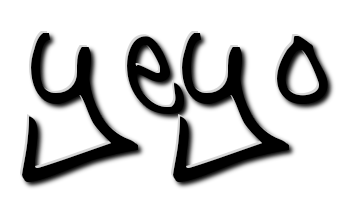

Ye Yo (Chango International Film Prod., 1974? copyright 1976) Exec Prod: Richard Prestipino; Prod: Antonio Prestipino; Dir-Scr: Toney Betancourt; Photo: Larry Revene, Peter Palian, Sal Sodano, Victor Petrashevich; Music: José Meriño, Los Duques; Theme Song: Carlitos Carrión; Asst Dir-Film Ed: Larry Revene; Sound/Dubbing: Haverland; Mixer: Paul Jaeger
Cast: Ricardo Reyes (Rogelio "Ye Yo" Sotomayor), Eppy Dueño (Detective Robles), Margarita Sosa (Angie), Carlos Roberto (Carlos), Carlos Carrión (Carrión, detective), Sonia López (Carmen), Frida Castro (Aunt Aurelia Sotomayor), Paquito Navarro (Miranda, detective), Cuca Vega, Pola Mari (Miranda's girlfriend), Rafael Font, Ángel Richardson, Baby (Hi-Fi) Colón, Carlos Adorno, Blakie, Leo Castro, Cartucho (Paco, man with gun), Evelyn Cuevas, José O. Coti, Margie de Jesús, Elizabeth Felton, Luis A. Feliciano, Lupe Garnica, Gil González, Rony González, Eddie Irizarry, Karhim, José Morales, Eduardo Mouri, Raffy Pérez, Israel Ramos, Anthony Reyes (cop), Cándido Rivera, Frankie Rosado, Gil Vázquez, Trío Los Duques
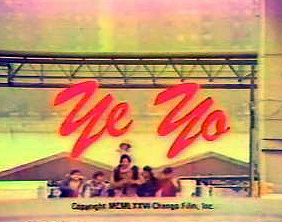
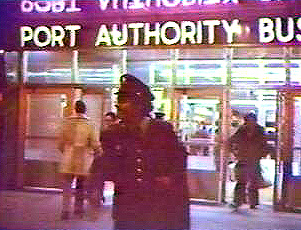

Notes: Ye Yo is, low-budget aside, a relatively slick (in terms of film technique) action drama with a few bits of socio-political commentary. It's almost a Nuyorican version of a blaxploitation movie--the protagonist spends the whole film being chased by, and shooting it out with, the police--except it's resolutely even-handed rather than slanted against the (white) Establishment.
Yes, Ye Yo is the "hero" of the movie. [note: the main title indicates "Ye Yo" is two words--it's a nickname for "Rogelio"--so I have retained this form here, although some sources give "Yeyo."] From the opening sequence, showing him loping down a New York street surrounded by adorning children, to his final escape to Puerto Rico, the movie sympathizes with his plight. And Ye Yo is no downtrodden fall guy: he never gives up, engaging in brutal hand-to-hand combat with policemen several times in the film, in addition to the gun battles which punctuate the picture.
On the other hand, Ye Yo devotes just as much footage to the activities (and even personal lives) of the (mostly Puerto Rican, it seems) New York City police force, specifically Detective Robles and patrolman Carlos. If anything, this attempt at "balance" hurts the film a little, particularly the very rapid inter-cutting from Ye Yo to Robles and back again, which results in some very short scenes and reduces their dramatic impact. [This may have been done to make sure the whole movie--not just the action scenes--races along at a frantic pace.] The police are not shown to be racist, brutal, or incompetent, which certainly distinguishes Ye Yo from many blaxploitation movies. Yes, they do kill Ye Yo's brother by indiscriminately shooting through a closed door, but it isn't like he was deliberately gunned down.
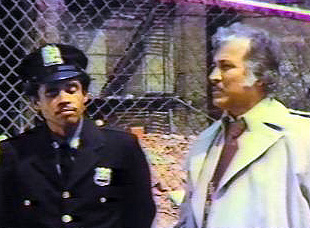
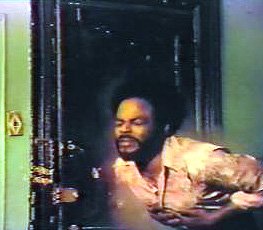
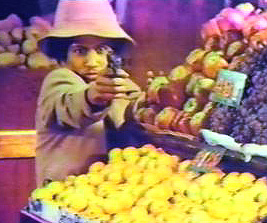
As noted above, there is some social commentary in Ye Yo, although it's muted. In one early scene, Ye Yo enters a neighborhood bodega where (comic relief) Paco and Pepe are talking. The storekeeper mutters that he's afraid the moreno (dark one) is going to rob the shop, and Ye Yo overhears. He takes a carton of milk and tosses it in the man's face, saying "I'm black, but not [I can't make out this word, it sounds like he's saying pincho]. I'm boricua [Puerto Rican], like you!" Later, Pepe and Paco are seen again, and one is boasting that he's not afraid of Ye Yo, but cringes when a different black customer walks by.
In another scene, the police are discussing the death of an "innocent man" (presumably Ye Yo's brother). Anglo police Captain Colbert assures Robles the incident will be investigated, and Robles replies he's afraid it will be a case of "just one more Puerto Rican [killed]." There are a number of scenes in which people criticize the police or refuse to cooperate with them (many people actively assist Ye Yo in his flight), and Robles despairingly says "there will never be an understanding between the people [pueblo] and [the police]." However, this is all rather curious given the generally sympathetic image of the police presented in the film, and to some extent it makes the "civilians" look unduly prejudiced (for example, when Ye Yo's aunt snubs patrolman Carlos on the street or insults Lt. Robles for their "persecution" of Ye Yo who did, after all, kill his wife and her boyfriend in cold blood!).
The cast of Ye Yo is headlined by Ricardo Reyes, born in the Dominican Republic but a resident of the USA since the age of 10. A stage veteran, Reyes also had a small role in another Nuyorican production (Prohibido amar en Nueva York, 1981). He also worked in public relations, music production, and other endeavours, and is currently a successful evangelist (www.ricardoreyesminstries.org). Ye Yo's nemesis is Eppy Dueño, who appeared several Nuyorican pictures, including Mataron a Elena and Soñar no cuesta nada, joven. The rest of the cast includes a number of "names" from the music and entertainment industry, including singer Carlitos Carrión and famous NY disco dj Paquito Navarro, as well as the beautiful Margarita Sosa. On the technical side, familiar Nuyorican cinema names Peter Palian and Lazslo Haverland appear in the credits, but the chief photographer, assistant director and film editor was Larry Revene, best known for his adult film work. Director Toney (or Tony) Betancourt was reportedly Cuban--with Revene's help, Betancourt turns in a slick, fast-paced pastiche of a Hollywood action film. There are lots of quick cuts, varied camera angles, tracking shots, and other formal techniques not generally associated with low-budget movies. [As a side note, Revene also shot but did not edit Natás es Satán, which contains many fewer of these formal cinematic niceties, so it is difficult to say who should receive special credit for making Ye Yo so visually interesting.] I am unfamiliar with Richard and Antonio Prestipino, who produced the movie, but they were probably completely legitimate businessmen.
A printed title at the end of the movie indicates Ye Yo was "based on a true story which occurred in New York City in 1960," but the movie is contemporary to its production date (the mid-1970s). Soldier Ye Yo returns to his home in New York City (arriving at the Port Authority Bus Terminal in uniform) and heads for his apartment. There, he discovers his wife in flagrante delicto with another man, and shoots them both to death. At his brother Raúl's apartment, Ye Yo learns what occurred: he was reported killed in action (presumably in Vietnam) by the government, so his wife really wasn't knowingly being unfaithful to him. Ye Yo was a prisoner of war and "not allowed to write" letters; when he was released, he didn't notify his family because he "wanted to surprise them." [I guess his wife was surprised, all right.]
[Since this is a movie, Ye Yo doesn't do the logical thing, i.e., turn himself in to the police and face manslaughter charges. A good lawyer could have gotten him a short sentence, given the circumstances of his case, but Ye Yo decides to stay with Raúl for a few days and then make his way to his parents who live "on the island" (Puerto Rico).]
Meanwhile, the police--led by Detective Robles--learn the "late" Ye Yo is still alive. Robles and patrolman Carlos--who is, as we see in a flashback--Ye Yo's brother-in-law, are tipped off to Ye Yo's hiding place by the cousin of Ye Yo's wife's lover. [Puerto Rican New York seems like a small town in this respect.] However, Ye Yo ducks out via the fire escape and the cops accidentally kill Raúl shooting through the locked door of the apartment.
Robles: "You idiot! This isn't Ye Yo! You killed an innocent man!"
Cop (in English): "I'm sorry."
Robles, Carlos, and Ye Yo have a confrontation in a nearby marketplace, the first of several such violent tussles in the movie. Stacks of fruit topple, spectators gape, bullets fly, but Ye Yo eludes capture once more. This time he takes refuge with Carmen. [Her relationship with Ye Yo is not explained, and in fact there seems to be some kind of continuity error or missing information here, since it's implied he had earlier met or contacted her in some way--she says she has a pistol for him--but this is supposed to be the afternoon following the murders and all of Ye Yo's waking time has been consumed with fleeing from the cops.]
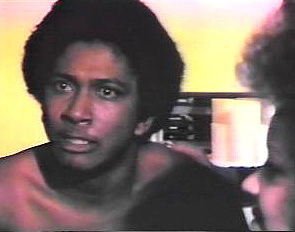
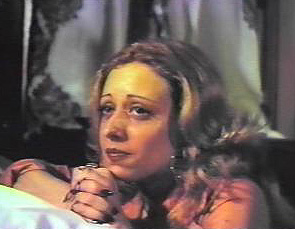

[Ye Yo now enters an odd phase, intercutting brief scenes with Ye Yo and footage of Robles and the other cops engaged in various activities, many of them unrelated to Ye Yo's case. We see Robles with his girlfriend Angie, detective Miranda having a cryptic conversation with his girlfriend, belligerent prisoners brought into the police station, a man reporting a missing wife, a detective interrogating a drug addict, meetings of police officials, etc. These are intercut with Ye Yo in Carmen's apartment. Several cops knock on Carmen's door; Ye Yo sneaks out the fire escape (again), comes up behind the policemen, and shoots them, then runs away when more police arrive.]
Robles interviews Ye Yo's aunt Aurelia, but she won't give him the time of day (she later snubs Carlos when they meet). Carlos bumps into Ye Yo on the street (in front of another fruit stand!) and is knocked out by the fugitive, who then uses martial arts to disable a plainclothes policeman before fleeing again. He hides in an abandoned building and a friend of Carmen brings him some food. [In another example of the small-town mentality of the picture, Carmen's friend is the girlfriend of Sammy, another policeman in the movie.] Ye Yo visits his aunt and admits he killed his wife "in error" but isn't as bad as the newspapers are painting him. [There is considerable confusion here and later: in one scene, a radio report says Ye Yo killed two policemen, but this occurs before the scene at Carmen's apartment. Later, Captain Colbert of the police says Ye Yo killed two people (his wife and her lover) and "wounded" others. In the final action sequence, Ye Yo definitely shoots additional policemen but their fate is unclear. These clues are further muddled by references to another cop killer and the arrest of a purse snatcher who confesses to being the "bomber" who has a plan to "wipe out" the police.]
There is a long flashback sequence to a family gathering for Ye Yo's birthday, a montage of Ye Yo and his wife, Ye Yo playing dominoes with Carlos, Ye Yo and his aunt, and finally, Ye Yo receiving his draft notice. Then the police show up at Aurelia's home and Ye Yo runs away once, more, hijacking a car at gunpoint to elude pursuit. He stops and asks gambler Paco (a little person with a tall blonde wife, seen shooting craps on the street) for more firepower, and is given a Mac-10 style gun and Paco's car. A shoot-out on a construction site leaves various cops down and Ye Yo wounded. He calls his aunt and makes arrangements to leave the country. Carlos tracks him to Aurelia's house via the bloodstains--when Ye Yo emerges to catch his ride to the airport, Carlos draws his gun but allows Ye Yo to depart unmolested. The movie concludes with footage of an airplane departing for Puerto Rico, and the printed information:
"Ye Yo is a true story which occurred in New York City in 1960. The daily struggle between the fugitive and the city's police occupied the headlines of all the newspapers. Despite the strong police cordon, Ye Yo escaped to Puerto Rico and it was there he began his new struggle for life. That story will continue in the next movie." [A sequel which, it appears, was never made.]
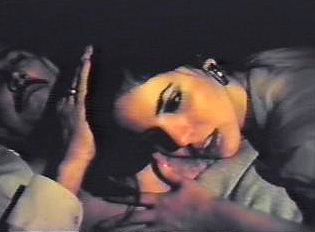
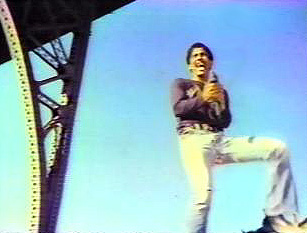
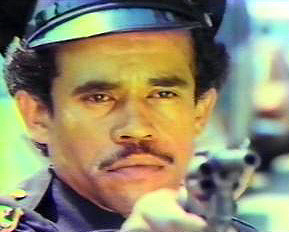
Despite some confusing plot points and a second act which loses focus, Ye Yo is a fast-paced, entertaining, and well-acted action film.
Update: Ye Yo was shown on a double-bill with El Callao at the Plaza Theater in Paterson, New Jersey on 3 March 1977.

